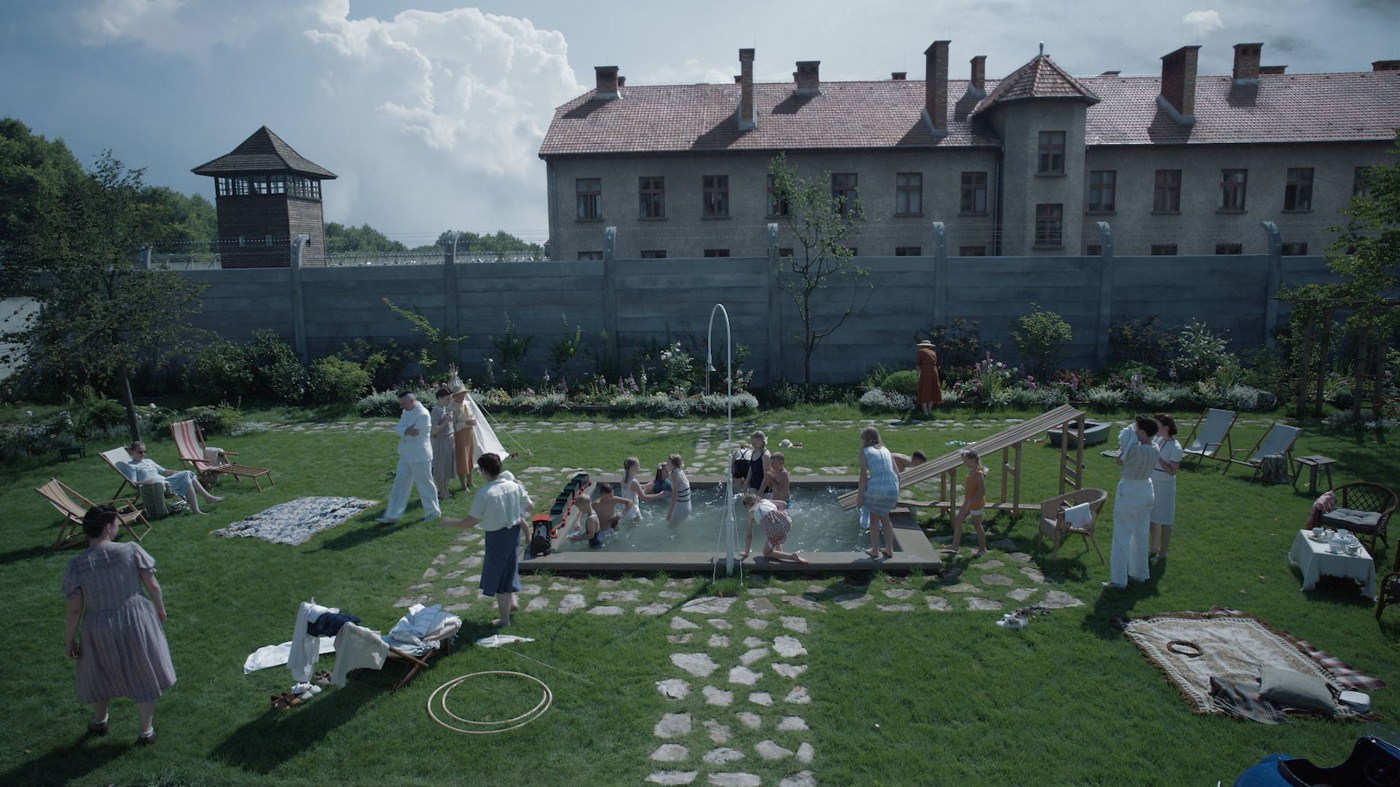
‘The Zone of Interest’ review: In this unforgettable Holocaust film, life outside of Auschwitz is devastatingly normal
A singular affront, in ways more conventionally wrenching movie treatments of the Holocaust such as “Schindler’s List” never were, “The Zone of Interest” withholds as much as it reveals, reorienting the audience’s perspective on the 20th century’s defining atrocity.
It is not for everyone, needless to say. Nothing is. But writer-director Jonathan Glazer’s 105-minute treatment of the 2014 Martin Amis novel of the same title is really not for everyone. The filmmaker, whose previous feature was “Under the Skin” a decade ago, has managed one of the most radical page-to-screen adaptations in recent memory. He has done so by tossing out Amis’ fictional “Les Liaisons Dangereuses”-style epistolary of sexual seduction, which I found compelling, pulpy — and morally offensive. Despite its awards and international praise, the movie may strike some as offensive, too, though for utterly different reasons.
This is an achievement destined for serious debate, in other words.
Factualizing Amis’s fabricated characters, which teetered on the edge of caricature, Glazer’s film uses real names of real people and his own imagining of their daily lives, just over the wall from the Auschwitz-Birkenau concentration camp.
In the commandant’s house and garden, SS officer Rudolph Höss (Christian Friedel), his wife Hedwig (Sandra Hüller of “Anatomy of a Fall”) and their five children go about their business. Scenes are placed before us, dispassionately, often without any camera movement but they’re never visually predictable. A birthday party. A boisterous gathering around the tiny swimming pool. A gentle walk among Hedwig’s prized flowers, with Hedwig cradling her newborn infant.
Others come and go: Jewish prisoners working as housecleaners, gardeners, laborers, eyes cast downward. In one scene, Hedwig gossips with friends, or — alone in her bedroom — tries on a stylish mink stole, stolen from a prisoners. At another point, from the perspective of the family’s yard, we hear, faintly, and then see in long shot a freight train carrying the latest load of prisoners to the camp.
In one striking passage, Hedwig’s mother comes for an extended visit. She admires what her daughter has done with the place, making it so welcoming and well-appointed. (At another point, the Höss children read through a guest book, where one visitor thanks the family for their “National Socialist hospitality.”) Then, a disruption. Hedwig’s mother has had a sleepless night. She leaves suddenly, unannounced. We, the audience, realize what the family does not want to believe — that the sounds from across the wall, inhuman wails, industrial moans, have proven too much for her. Everyone in this family, and this serenely hideous corner of the Final Solution, knows exactly what is going on every minute.
“The Zone of Interest” takes enormous chances without enormous dramatic machinery. Its startling contrast of mundane, strategically dispassionate tones and imagery is upended by a sound and musical-score design that cries out from a sort of mass subconscious of suffering. Mica Levi, one of the best composers working in film today, did the music, deployed in brief, arresting bursts; sound designer Johnnie Burn, working from 600 pages of Auschwitz research documents, created the brilliant aural landscape.
The actors are denied most of the customary dramatic assists of cinema performance; the acting feels like behavior, not acting, and you can count the close-ups on two hands. With calm detachment, director Glazer and cinematographer Lukasz Zal favor middle- and long-shot compositions, giving the viewer literal distance while enforcing our experiencing of taking it all in. Even so, we get precisely what we need from Friedel and Hüller; with exactly the right brio, Hedwig proudly tells her mother that “Rudi calls me the Queen of Auschwitz.”
Zal used up to 10 cameras, often hidden from the actors, positioned around the house and grounds, so that the performers could improvise lines and physical behavior with ease. Glazer probably did himself no favors by describing this approach as “Big Brother in the Nazi house.” The aesthetic result of all these design and directorial decisions, though, is anything but glib (though some dialogue, such as a riverside talk between Rudolf and Hedwig, underlines the characters’ vicious delusions too neatly). We watch these human beings do what they do, as if all is for the best in this worst of all possible worlds. And if a family swim, photographed from a distance, happens to be interrupted by bones floating downstream from the camp, in this world — our world — these things happen.
In his autobiography, written after the Nuremberg trials while he awaited his 1947 execution in the camp he managed, Höss rationalized that he was merely “a cog in the wheel of the great extermination machine created by the Third Reich.” An American military psychologist at the time wrote that the Auschwitz commandant was “intellectually normal, but with the schizoid apathy, insensitivity and lack of empathy that could hardly be more extreme in a frank psychotic.”
In Glazer’s film, the barbarity is everywhere, every second, behind a devastating guise of normalcy. It needs no demonizing flourishes. This may be the first film dealing in any way with the Holocaust that dares to strip away the movies’ reliance on dramatizing subhuman or inhuman evil in ways audiences are used to receiving — and, dangerously, dismissing as ancient history, long ago and far away. At the climax we see the career-climbing Höss, having been called to his next post, away from the home he has grown to love, peering into a dark hallway. He sees a strange vision, a foreshadowing he cannot fathom. It is beyond words.
I won’t soon forget it. Or much of anything about “The Zone of Interest.”
———
‘THE ZONE OF INTEREST’
4 stars (out of 4)
MPA rating: PG-13 (for thematic material, some suggestive material and smoking)
Running time: 1:45
How to watch: Now in theaters
———
©2024 Chicago Tribune. Visit chicagotribune.com. Distributed by Tribune Content Agency, LLC.


